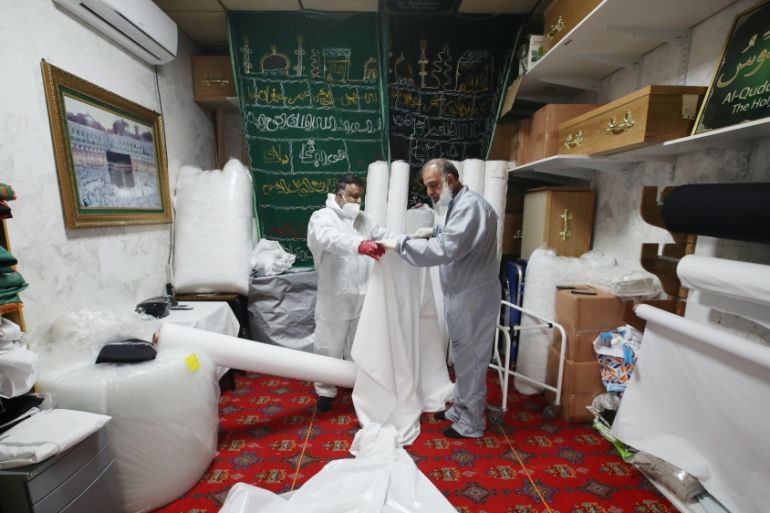Amid the coronavirus, bailing out mosques is essential
Mosques provide important community services that are needed now more than ever, but many may not survive without help.

This Ramadan, mosques in the UK and across much of Europe and North America are going through a financial crisis due to coronavirus lockdown restrictions. We have a duty to help these essential places of worship, which often simultaneously function as community hubs, charities and education centres, to protect the spiritual, social and physical wellbeing of Muslim communities and the wider society.
Muslim-led charities, which offer important support for the most vulnerable members of various communities, have also been hit hard by the pandemic. While all charities experienced some reduction in income since the beginning of the crisis, because the lockdowns coincided with the month of Ramadan, the economic toll of this public health emergency has been particularly high on Muslim charities. Many Muslim charities receive a significant portion of their donations – perhaps 35 percent or more – during the month of Ramadan. Much of this fundraising is now impossible due to social distancing measures.
Keep reading
list of 4 itemsMexico’s teachers seek relief from pandemic-era spike in school robberies
‘A bad chapter’: Tracing the origins of Ecuador’s rise in gang violence
Why is the US economy so resilient?
Some of these charities, particularly the larger ones, may emerge relatively unscathed from the crisis. They have large reserves, as well as automated residual donations, much of which will continue.
Many mosques, however, lack this infrastructure.
In the UK, for example, it can cost around $2,500 a month (£2,000) to keep the smallest of mosques open. For the bigger mosques that serve tens of thousands of congregants, monthly costs often exceed $125,000.
Most mosques have little to no cash reserves, and survive simply on collection bucket donations from one Friday prayer to the next. Others rely on larger, one-off donations they receive during the month of Ramadan to stay afloat throughout the year. With lockdowns and other restrictions continuing with no end in sight, however, many of these places of worship are now facing the prospect of closing their doors for good.
This would be a tragedy and not just for practising Muslims. Mosques are much more than just places of worship. They provide much-needed community services like supplementary education, welfare and aid, counselling and even career and legal advice. They help children with out-of-school clubs and classes. They support women and the elderly, and are hubs for charity and interfaith work.
Despite the odds being stacked against them, many mosques across Europe and beyond also joined the front-line fight against COVID-19. In the UK, for example, mosques swiftly transformed their facilities to serve as morgues, hospices and food distribution centres during this time of crisis. Some mosques even directly made PPE donations to local hospitals.
The services offered by mosques are essential for the economic wellbeing of not only the communities they serve but society at large.
In the UK, 50 percent of the Muslim population is facing poverty and deprivation. Any service – delivered through or by a mosque – that helps these communities to be economically productive and self-reliant, without using government resources, benefits not only Muslims but all taxpayers. What this means is that if the pandemic takes away British Muslims’ places of worship, socialising and support – as well as a disproportionate number of their lives – there will be dire consequences for all communities.
Just like businesses, charities and the self-employed, mosques need a lifeline. Large Muslim-led charities, which have built the necessary safety nets to ride out this crisis thanks to the generosity of Muslim communities, now need to do everything they can to support mosques that are essential for the survival of the communities they care for.
My charity, Penny Appeal has already issued tens of thousands of pounds to various mosques at this difficult time, and is setting up a special COVID-19 mosque bailout fund, as we expect demand to increase in the coming weeks and months as mosques burn through their limited reserves.
But these are just short-term solutions. In the long term, we should work to make mosques – and all places of worship and assistance – financially independent and sustainable.
In Muslim-majority countries, most mosques are supported by “waqfs” or inalienable charitable endowments. The waqf system, which was built over many centuries, has protected faith-based institutions through times of war, famine, and yes, even pandemic.
Combined with sound financial management and investments, these endowments can ensure that mosques can weather any storm, and continue to provide the support that Muslims and people of all faiths and none receive from these places of worship.
This is not a model limited to Muslim-majority countries: similar to the waqf model, the Church of England is sitting on a combination of ancient endowments and investments worth £8.3bn, making it the UK’s biggest charity (its income is more than three times that of Oxfam’s). British Muslim communities have just not had the relative time to develop these strong financial safety nets.
We need to develop similar systems to protect mosques in Europe and North America. But until then, charities, organisations and individuals who have the necessary financial means should do everything they can to help these essential places of worship, support and solidarity.
Since the beginning of this pandemic, mosques have been on the front line of the fight against COVID-19, encouraging social distancing, distributing key health information, and offering support to people from all backgrounds and faiths. Just as they have stood by our society at its darkest hour, we must do the same for them.
The views expressed in this article are the author’s own and do not necessarily reflect Al Jazeera’s editorial stance.
